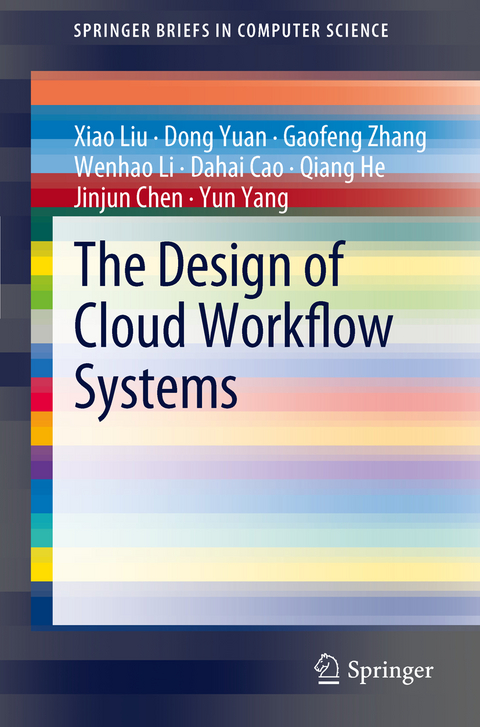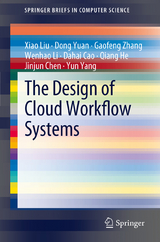The Design of Cloud Workflow Systems
Springer-Verlag New York Inc.
978-1-4614-1932-7 (ISBN)
Xiao Liu received his PhD degree in Computer Science and Software Engineering from the Faculty of Information and Communication Technologies at Swinburne University of Technology, Melbourne, Australia in 2011. He received his Master and Bachelor degree from the School of Management, Hefei University of Technology, Hefei, China, in 2007 and 2004 respectively, all in Information Management and Information System. He is currently a postdoctoral research fellow in the Centre of Computing and Engineering Software System at Swinburne University of Technology. His research interests include workflow management systems, scientific workflow, business process management and quality of service. Dong Yuan received the Bachelor degree in 2005 and Master degree in 2008 both from Shandong University, Jinan, China, all in Computer Science. He is currently a PhD student in the Faculty of Information and Communication Technologies at Swinburne University of Technology, Melbourne, Australia. His research interests include data management in workflow systems, scheduling and resource management, grid and cloud computing. Gaofeng Zhang received the Bachelor and Master degrees in Computer Science from Hefei University of Technology, Hefei, China, in 2005 and 2008 respectively. He is currently working toward the PhD degree in Information and Communication Technology under the supervision of A/Prof. Jinjun Chen and Prof. Yun Yang in Faulty of Information and Communication Technologies, Swinburne University of Technology, Melbourne, Australia. His research interests include privacy protection strategy, risk evaluation, and security mechanism in cloud computing. Wenhao Li obtained his Bachelor and Master degree of Engineering from Shan Dong University in China in 2007 and 2010 respectively. He participated in a program funds by National Natural Science Foundation of China during his postgraduate studies and published several papers in national and international journals. He is currently a first-year PhD candidate in Faculty of Information and Communication Technologies, Swinburne University of Technology, supervised by Prof. Yun Yang and A/Prof. Jinjun Chen. He‟s research interests include parallel and distributed computing, cloud and grid computing, workflow technologies and data management in distributed computing environment. Dahai Cao received his master degree in software engineering from Tsinghua University, Beijing, China, 2005. He is currently a PhD student in Swinburne University Centre for Computing and Engineering Software Systems, Melbourne, Australia. His research interests include cloud-based large-scale workflow management systems, adaptive workflow management and cloud computing. received his master degree in software engineering from Tsinghua University, Beijing, China, 2005. He is currently a PhD student in Swinburne University Centre for Computing and Engineering Software Systems, Melbourne, Australia. His research interests include cloud-based large-scale workflow management systems, adaptive workflow management and cloud computing. Qiang He received his first Ph. D. degree in information and communication technology from Swinburne University of Technology (SUT), Australia, in 2009 and his second Ph. D. degree in computer science and engineering from Huazhong University of Science and Technology (HUST), China, in 2010. He is now a research fellow at SUT. His research interests include services computing, cloud computing, P2P system, workflow management and agent technologies. Jinjun Chen received his PhD degree in Computer Science and Software Engineering from Swinburne University of Technology, Melbourne, Australia in 2007. He is currently an associate Professor in the Faculty of Engineering and Information Technology, University of Technology, Sydney, Australia. His research interests include Scientific workflow management andapplications, workflow management and applications in Web service or SOC environments, workflow management and applications in grid (service)/cloud computing environments, software verification and validation in workflow systems, QoS and resource scheduling in distributed computing systems such as cloud computing, service oriented computing, semantics and knowledge management, cloud computing. Yun Yang received a Master of Engineering degree from The University of Science and Technology of China, Hefei, China, in 1987, and a PhD degree from The University of Queensland, Brisbane, Australia, in 1992, all in computer science. He is currently a full Professor in the Faculty of Information and Communication Technologies at Swinburne University of Technology, Melbourne, Australia. Prior to joining Swinburne as an Associate Professor in late 1999, he was a Lecture and Senior Lecturer at Deakin University during 1996-1999. Before that, he was a Research Scientist at DSTC - Cooperative Research Centre for Distributed Systems Technology during 1993-1996. He also worked at Beihang University in China during 1987-1988. He has published more about 200 papers on journals and refereed conferences. His research interests include software engineering; p2p, grid and cloud computing; workflow systems; service-oriented computing; Internet computing applications; and CSCW.
Introduction.- Workflow Systems in the Cloud.- Cloud Workflow System Architecture.- Cloud Workflow System Functionality.- Cloud Workflow System Quality of Service.- Case Study: SWINDEW-C Cloud Workflow System.- Bibliography.- Appendices.
| Reihe/Serie | SpringerBriefs in Computer Science |
|---|---|
| Zusatzinfo | 33 Illustrations, black and white; XIV, 97 p. 33 illus. |
| Verlagsort | New York, NY |
| Sprache | englisch |
| Maße | 155 x 235 mm |
| Themenwelt | Mathematik / Informatik ► Informatik ► Betriebssysteme / Server |
| Mathematik / Informatik ► Informatik ► Netzwerke | |
| Mathematik / Informatik ► Informatik ► Software Entwicklung | |
| ISBN-10 | 1-4614-1932-8 / 1461419328 |
| ISBN-13 | 978-1-4614-1932-7 / 9781461419327 |
| Zustand | Neuware |
| Haben Sie eine Frage zum Produkt? |
aus dem Bereich




